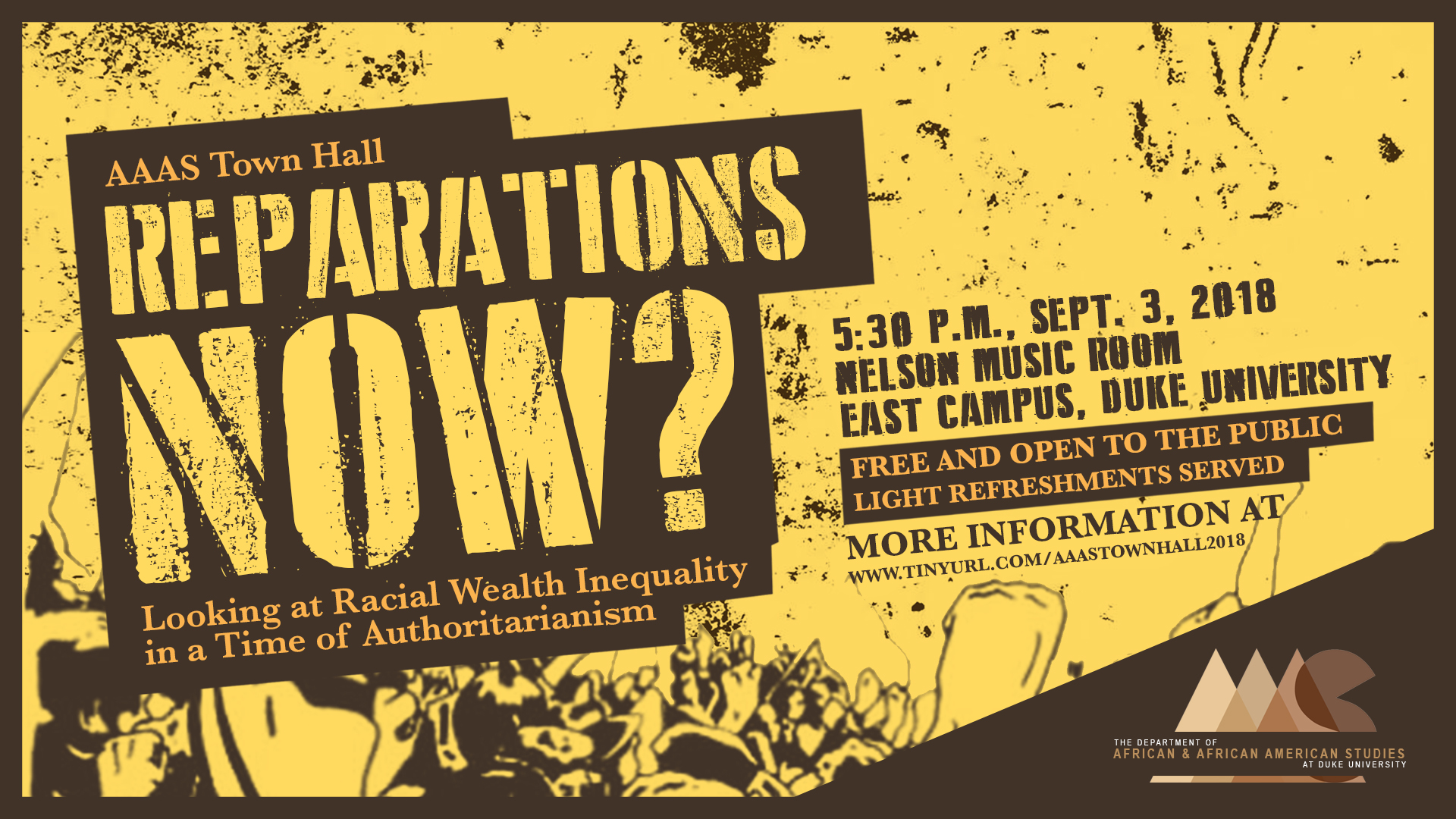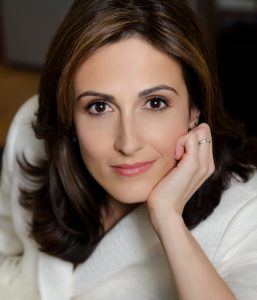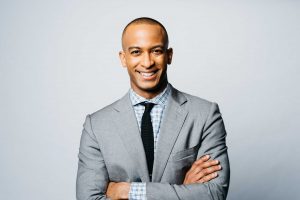Home » Posts tagged 'political science'
Tag Archives: political science
AAAS Town Hall 2018: Reparations Now?
 The Department of African and African American Studies (AAAS) at Duke University will kick off the 2018 academic year with a town hall forum on reparations.
The Department of African and African American Studies (AAAS) at Duke University will kick off the 2018 academic year with a town hall forum on reparations.
The event, “Reparations Now? Looking at Racial Wealth Inequality in a Time of Authoritarianism,” will be held at 5:30 p.m. on Monday, Sept. 3rd, in the Nelson Music Room, East Duke 201, on the university’s East Campus. It is free and open to the public. Light refreshments will be served.
Panelists will address the question: What might come of public dialogue around the question of reparations for African Americans in the era of the Trump regime with its continual attacks on the press and dissemination of knowledge, and while there is a Republican-controlled Congress?
“We are living through a moment when two converging elements of our social, political, and economic existence are coming together: the existence of heavily racialized wealth inequality and increasing authoritarianism,” says Wahneema Lubiano, a professor of African and African American Studies.
Lubiano is co-organizing the event with William “Sandy” Darity, the Samuel DuBois Cook Professor of Public Policy, and a professor in the Sanford School of Public Policy, Department of Economics as well as the Department of African and African American Studies.
Darity has been a long-time advocate of reparations for black Americans. In a 2016 article in The Atlantic he wrote, “There is no doubt that the political obstacles to congressional approval of black reparations are significant. … If black reparations is the right thing to do—and I know in the depth of my soul that it is—then we should work to make it happen, no matter how long the odds. We should not bow at the altar of presumed political expediency.”
Lubiano says that raising the issue of black reparations offers an opportunity to consider “the complexities of black reparations against the fear that U.S. democracy itself is being roiled by authoritarianism.”
“We’re going to discuss what reparations has meant and could mean, what concepts are embedded in the public discussion of wealth inequality, and what the relation of reparations might be to changing racialized wealth inequality, all while authoritarianism is both gathering force and contested,” she said.
Panelists are:
- William A. Darity, Jr.
Duke Sanford School of Public Policy, Departments of African & African American Studies, and Economics - Laurent Dubois
Duke Department of History - Malik C. Edwards
NCCU School of Law - Amber S. Hendley
Duke Departments of Economics and Political Science - Andrew Lee
Duke Department of Computer Science - Wahneema Lubiano
Duke Department of African & African American Studies - Joseph R. Winters
Duke Departments of Religious Studies and African & African American Studies
Changing Demographics: The 2016 Election in Black and Brown

“There is a social crisis in white America,” said Dorian Warren, a political analyst and former host of MSNBC’s “Nerding Out.”
“All the dysfunctions that have historically plagued black people are now also affecting poor whites,” Warren said, referencing poverty, lack of education, higher death rates and the scourge of drug addiction, among other social ills.
“For the first time, they think their children are going to have a worse life than they did.”
Warren, a fellow at the Roosevelt Institute, was one of the panelists during a wide-ranging Thursday evening discussion hosted by the Duke Council on Race and Ethnicity (DCORE), “The 2016 Election in Black and Brown.”
The panel also included Duke alumna Victoria DeFrancesco Soto, Ph.D. ’07, an MSNBC and Telemundo contributor; and Duke political science and African and African American Studies associate professor Kerry Haynie.
Mark Anthony Neal, a professor of black popular culture and DCORE co-director, moderated the conversation about the political power of Latinos, blacks, women, working-class whites and other ethnic groups.
“It’s troubling to watch as a political scientist,” said Haynie, referring to the racism and xenophobia marking Donald Trump’s campaign that many scholars thought was a relic of the past.
He said the election results will have an enormous effect on people of color. Citing a Pew study, Haynie said there is an increase in voter diversity as the demographics of the U.S. change and there are more eligible Latino voters.
“I think this growth is the answer to what we see from Trump and his followers,” Haynie said, attributing the zeal, for example, to enact voter ID laws to anxiety some whites feel due to the country’s changing demographics. “Where poor whites are hurting the most, they’ve been governed by Republicans.”
Warren predicted that anger over police killings of unarmed citizens will mobilize voters and that social movements, such as Black Lives Matter, could help determine the White House’s social and economic agenda.
“Progressive folks need to think about the appropriate strategy to hold the president accountable,” Warren said.
“Trump talking about ‘law and order’ is a reaction,” to the Black Lives Matter movement, Haynie said. “It remains to be seen whether that movement will show up at the polls Nov. 8.”
Haynie described “linked fate,” the idea that black people, no matter their socioeconomic class, will suffer the same ramifications of structural inequality and racism. Therefore, they tend to vote similarly, supporting Democrats, he said.
DeFrancesco Soto said that, to understand the interests of ethnic Latinos and how they will vote, it’s important to understand why they immigrated to the U.S.
“Some come for economic reasons. Mexicans and Dominicans tend to have higher poverty rates. Cubans, Guatemalans came over for political reasons. Their interests are going to be different off the bat,” DeFrancesco Soto said. “It’s easier to cast Latinos in the immigration bucket.”
She said Republicans had made inroads with the Latino community in past elections, pushing through legislation they favored, such as No Child Left Behind.
“There was a time when the party was on the cusp of really laying down a foundation with the Latino electorate,” DeFrancesco Soto said. “I believe core Latino Republicans would be receptive to a born-again Republican Party.”
She added that a newly leaked email from the Democratic Party with “needy Latinos” in the subject line underscores Latino leaders’ mistrust of Hillary Clinton.
“Latinos have had questions about Clinton. They feel they are being taken for granted,” she said.
In regards to Clinton’s reputation in general, Haynie said she does have “high negatives,” but some of the things pinned on her are not her own doing.
“A critique of President Bill Clinton’s policies should be just that, a critique of his policy. I think this only happens to women in politics — you get saddled with something your husband did,” Haynie said.
Neal added that there is a subset of people who cannot accept a woman being the face of the “American empire.” The panelists said that other countries have been more accepting of female leaders and perhaps that is indicative of the fragility of the country.
“The identity politics happening in this election is around white men,” Warren said. “There is a real feeling of loss that is not going away. I just want to turn to them (white men) and say, ‘It’s going to be OK. You still live in an empire.’”
The event was co-sponsored by The Graduate School and the Department of Political Science.
DCORE is an interdisciplinary association of centers, working groups and scholars who research the cultural, political, legal and social dimensions and consequences of racial and ethnic identity. For more information, visit sites.duke.edu/dcore.
The 2016 Election in Black and Brown
The Duke Council on Race and Ethnicity (DCORE)
Presents
The 2016 Election in Black and Brown
5:30 p.m., Thursday, Oct. 13
Perkins 217, West Campus
A moderated discussion of the role of race and ethnicity in the U.S. presidential election. Free and open to the public.
Victoria DeFrancesco Soto, Ph.D. ‘07
MSNBC, NBCNews.com, and Telemundo contributor
Director of Community Outreach, Center for Mexican-American Studies, University of Texas
Dorian T. Warren
Fellow, Roosevelt Institute
Former host of MSNBC’s “Nerding Out”

Kerry Haynie
Associate Professor, Department of Political Science
Co-Director, Duke Council on Race and Ethnicity
Moderated by
Mark Anthony Neal
Professor, African and African American Studies, Duke University
Co-Director, Duke Council on Race and Ethnicity
Topics include:
• the importance of the black and brown vote
• racism and xenophobia in a presidential campaign
• the consequences for people of color under a Clinton or Trump administration
• the future of black and Latino politics and race relations in the U.S.
Q & A to follow.
Co-sponsored by The Graduate School.
Biographies:
Victoria DeFrancesco Soto, Ph.D. ‘07
MSNBC, NBCNews.com, and Telemundo contributor
Director of Community Outreach, Center for Mexican-American Studies, University of Texas
DeFrancesco Soto received her Ph.D. in political science from Duke University during which time she was a National Science Foundation Fellow. She is currently a Professor at the University of Texas where she was selected as one of the university’s “Game Changing” faculty. DeFrancesco Soto teaches in the Department of Mexican-American and Latino Studies and is a Fellow at the Center for Politics and Governance at the LBJ School of Public Affairs. Named one of the top 12 scholars in the country by Diverse magazine DeFrancesco Soto previously taught at Northwestern University and Rutgers.
DeFrancesco Soto translates social science research into a more relatable form of information for a wide variety of audiences. She is a contributor to MSNBC and NBCNews.com as well as a regular political analyst for Telemundo. She is also widely published in both academic and popular outlets such as POLITICO and Talking Points Memo.
Dorian Warren
Fellow, Roosevelt Institute
Former host of MSNBC’s “Nerding Out”
Warren is a Fellow at the Roosevelt Institute and Board Chair of the Center for Community Change. A scholar of inequality and American politics, he taught for over a decade at the University of Chicago and Columbia University, where he was co-director of the Columbia University Program on Labor Law and Policy. He is a former MSNBC Contributor and was host and executive producer of “Nerding Out” on MSNBC’s digital platform.
Warren has worked to advance racial, economic and social justice campaigns for over two decades with many progressive national and local organizations including the Leadership Conference on Civil and Human Rights, American Rights at Work/Jobs with Justice, and the AFL-CIO, among others. He is also co-chair of the AFL-CIO’s Commission on Racial and Economic Justice Advisory Council. He currently serves on several boards including Alliance for a Greater New York, Working Partnerships USA, and The Nation Magazine Editorial Board.
As a commentator on public affairs, Warren has appeared regularly on television and radio including NBC Nightly News, ABC, MSNBC, CNN, CNBC, BET, BBC, NPR, Bloomberg, & NY1, among other outlets. He has also written for The Nation, Huffington Post, Newsweek, Salon, Washington Post, New York Times, Ebony.com, and Boston Review.
In 2013, he was included on the list of NBC’s theGrio’s 100 people making history today. After growing up on the South Side of Chicago, Warren received his B.A. from the University of Illinois and his M.A. and Ph.D. in political science from Yale University.
Kerry Haynie
Associate Professor, Department of Political Science
Co-Director, Duke Council on Race and Ethnicity
Duke University
Haynie’s research and teaching interests are in race and ethnic politics, intersections of race and gender, legislative processes, state-level politics, southern politics, and comparative urban politics. He is one of the editors of the journal, Politics, Groups, and Identities. He has been published in numerous journals including The Journal of Politics; Legislative Studies Quarterly; Politics, Groups, and Identities; and the International Journal of Africana Studies.
His publications include New Race Politics in America: Understanding Minority and Immigrant Voting (co-edited with Jane Junn), and African American Legislators in the American States, among others.
Haynie has traveled widely speaking on race and politics, including invited talks in France, Germany, and South Africa. He is the co-winner of the American Political Science Association’s Women and Politics Research Section’s Best Paper Award for 2012. He was recently elected co-president of the American Political Science Association’s section on Race and Ethnic Politics.






